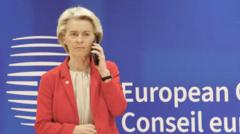The ruling represents a significant push for accountability and transparency in the European Union's decision-making processes.
**European Court Demands Transparency: von der Leyen's Messages Must Be Released**

**European Court Demands Transparency: von der Leyen's Messages Must Be Released**
The EU's top court rules against the European Commission's refusal to disclose texts related to Covid-19 vaccine negotiations.
In a groundbreaking decision, the EU's General Court has ruled that the European Commission erred in denying a request for the release of text messages sent by Ursula von der Leyen, President of the Commission, to Albert Bourla, CEO of Pfizer, during the pivotal negotiations for Covid-19 vaccines. This ruling challenges a previous stance taken by the Commission, which failed to provide a convincing rationale for withholding the communications requested by a journalist in 2021, amidst growing concerns about transparency and accountability within EU institutions.
The urgency of the request stemmed from a historic vaccine agreement in which Pfizer secured contracts worth billions with the EU, encompassing additional supplies of 1.8 billion doses. Although the court's decision allows for the potential release of these messages, the content remains unknown, perpetuating the controversy dubbed "Pfizergate" as mistrust brews in the corridors of Brussels.
Transparency International has celebrated this judicial verdict as a "landmark victory," arguing it signals a shift towards greater accountability in EU governance, urging an end to restrictive information access policies. Ursula von der Leyen, who ascended to her role in 2019 and has since played a crucial part in the EU's pandemic responses, may face reputational damage as the ruling casts doubt on the transparency of vaccine dealings, especially as she recently secured a second term.
The controversy initially surfaced in April 2021 following a report by a New York Times journalist revealing that von der Leyen had engaged in private discussions with Bourla after the approval of BioNTech's vaccine. Subsequent efforts by journalist Alexander Fanta to access these messages via a Freedom of Information request were thwarted by the Commission claiming a lack of documentation. However, the court contended that the Commission relied on unfounded assumptions regarding the preservation of crucial records.
Fanta's pursuit led to an investigation by the European Ombudsman, which concluded that the Commission's inaction constituted maladministration. The court's recent ruling reinforced the stance that the onus is on the Commission to provide evidence if such text messages are non-existent or to clarify whether any might have been intentionally deleted. This case highlights the ongoing tensions surrounding transparency, record-keeping, and public accountability within the EU.





















